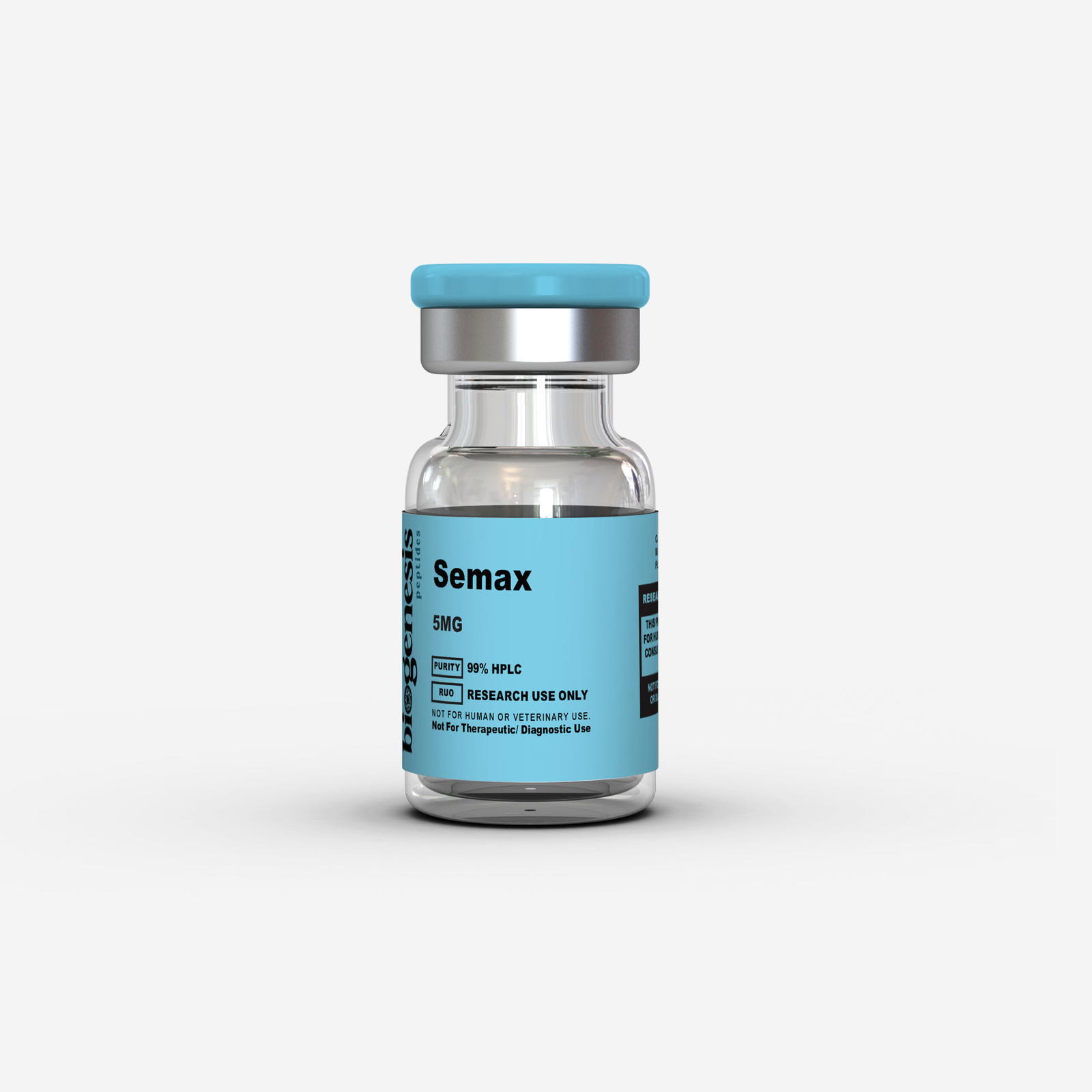Product Usage
THIS PRODUCT IS INTENDED AS A RESEARCH CHEMICAL ONLY. This designation allows the use of research chemicals strictly for in vitro testing and laboratory experimentation only. All product information available on this website is for educational purposes only. Bodily introduction of any kind into humans or animals is strictly forbidden by law. This product should only be handled by licensed, qualified professionals. This product is not a drug, food, or cosmetic and may not be misbranded, misused, or mislabeled as a drug, food, or cosmetic.
Semax 5mg
Semax is a synthetic derivative of adrenocorticotropic hormone (ACTH), originally developed in Russia for its neuroprotective, cognitive-enhancing, and immune-boosting properties.
$40.00
Peptides will arrive in a lyophilized (powder) form for maximum stability
Out of stock
Buy 5 for 5% off
Buy 10 for 10% off
Buy 15 for 15% off
OVERVIEW
Semax is a synthetic derivative of adrenocorticotropic hormone (ACTH), originally developed in Russia for its neuroprotective, cognitive-enhancing, and immune-boosting properties. Research suggests that Semax may:
- Increase brain-derived neurotrophic factor (BDNF), supporting neuroplasticity and learning.
- Enhance immune function and reduce inflammation.
- Protect neurons from ischemic damage, aiding in stroke and traumatic brain injury (TBI) recovery.
- Improve cardiovascular function, potentially enhancing blood circulation.
- Act as an antidepressant and anxiolytic (anti-anxiety agent) by modulating serotonin, dopamine, and BDNF levels.
Due to its ability to support mental performance, reduce stress, and promote neurological recovery, Semax is widely researched in neurology, cognitive enhancement, and immune regulation.
RESEARCH
Semax and Stroke Recovery
Semax has been extensively studied for its neuroprotective effects in stroke and traumatic brain injury (TBI).
- In rat models of stroke, Semax activated 24 genes linked to vascular function, promoting neurogenesis and protecting against ischemic damage.
- Clinical trials in stroke patients showed that those receiving Semax experienced faster motor function recovery and improved neurological outcomes.
- BDNF elevation facilitated brain plasticity and functional rehabilitation.
These findings suggest Semax could be a promising treatment for post-stroke recovery and neurodegenerative conditions.
Semax and Cognitive Enhancement
Semax has been studied for its potential as a nootropic (cognitive enhancer):
- Increases BDNF levels in the hippocampus, improving learning and memory formation.
- Enhances prefrontal cortex activity, potentially boosting problem-solving skills and attention span.
- Protects against cognitive decline, possibly preventing age-related memory loss.
These neuroprotective and cognitive-enhancing effects make Semax a promising compound for cognitive longevity and brain health.
Semax and the Default Mode Network (DMN)
- Functional MRI studies suggest that Semax activates the Default Mode Network (DMN), a system responsible for:
- Social cognition
- Environmental awareness
- Resting-state brain activity
- Enhanced DMN function is linked to better focus, cognitive flexibility, and mental clarity.
- DMN disruptions are associated with neurodegenerative diseases like Alzheimer’s, suggesting Semax may play a neuroprotective role.
Semax and Depression/Anxiety
Semax may offer antidepressant and anxiolytic effects by modulating serotonin, dopamine, and BDNF levels.
- Animal studies show that Semax increases BDNF production, reducing depressive symptoms.
- Unlike SSRIs, Semax may work faster by directly increasing neurotrophic support, rather than altering serotonin levels alone.
- Potential as an adjunct therapy with antidepressants for enhanced efficacy.
Semax and Pain Management
Research suggests Semax may help regulate pain perception by influencing the opioid system:
- Prevents the breakdown of enkephalins, the brain’s natural painkillers.
- May provide an alternative approach for chronic pain management.
Semax and Immune System Support
- Suppresses IL-6, a key inflammatory cytokine involved in stress response and immune dysfunction.
- Enhances T-helper cell activity, leading to better immune system balance.
- Potential antiviral properties, suggesting possible applications in infection recovery.
STRUCTURE
- Molecular Formula: C₃₉H₅₄N₁₀O₁₀S
- Molecular Weight: 854.99 g/mol
- Amino Acid Sequence: Ac-Met-Glu-His-Phe-Pro-Gly-Pro
- CAS Registry Number: 80714-61-0
- PubChem Identifier: 122178
- Synonyms: Pro-Gly-Pro-ACTH, ACTH(4-10) analog
CITATIONS
- Lebedeva, I. S. et al. Effects of Semax on the Default Mode Network of the Brain. Bulletin of Experimental Biology and Medicine (2018).
- Mars, R. B. et al. On the relationship between the default mode network and the social brain. Front. Hum. Neurosci. (2012).
- Medvedeva, E. V. et al. The peptide Semax affects the expression of genes related to the immune and vascular systems in rat brain focal ischemia. BMC Genomics (2014).
- Gusev, E. I. et al. The efficacy of Semax in the treatment of patients at different stages of ischemic stroke.Zhurnal Nevrologii i Psikhiatrii (2018).
- Agapova, T. I. et al. Effect of Semax on BDNF and NGF gene expression in the rat hippocampus and frontal cortex. Molecular Genetics, Microbiology, and Virology (2008).
- Scantlebury, M. H. et al. Adrenocorticotropic Hormone Protects Learning and Memory Function in Epileptic Mice. Neuroscience Letters (2017).
- Deltheil, T. et al. Behavioral and serotonergic consequences of increasing hippocampus BDNF protein levels.Neuropharmacology (2008).
- Bobyntsev, I. I. et al. Influence of ACTG4-7-PGP (Semax) on the morphofunctional state of hepatocytes in chronic stress. Bulletin of Experimental Biology and Medicine (2017).
- Bobyntsev, I. I. et al. The effect of ACTH-4-7-PGP peptide on lipid peroxidation and stress response in rats.Research Gate (2015).
All products on this site are for Research, Development use only. Products are Not for Human consumption of any kind.
The statements made within this website have not been evaluated by the US Food and Drug Administration. The statements and the products of this company are not intended to diagnose, treat, cure or prevent any disease.
Biogenesis Peptides is a chemical supplier. Biogenesis Peptides is not a compounding pharmacy or chemical compounding facility as defined under 503A of the Federal Food, Drug, and Cosmetic act. Biogenesis Peptides is not an outsourcing facility as defined under 503B of the Federal Food, Drug, and Cosmetic act.

